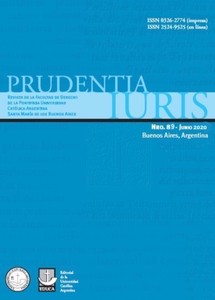Please use this identifier to cite or link to this item:
https://repositorio.uca.edu.ar/handle/123456789/10147| Título: | ¿Cuál es el fundamento moral del neoconstitucionalismo? : una lectura a la luz del emotivismo ético descripto por Macintyre What is the moral foundation of neoconstitutionalism? : A reading in light of the ethical emotivism described by MacIntyre Qual è il fondamento morale del neoconituzionalismo? : Una lettura alla luce dell'emotivismo etico descritto da MacIntyre |
Autor: | Ocantos, Jorge | Palabras clave: | NEOCONSTITUCIONALISMO; DERECHOS HUMANOS; FILOSOFIA DEL DERECHO; MacIntyre, Alasdair, 1929- | Fecha de publicación: | 2020 | Editorial: | Universidad Católica Argentina. Facultad de Derecho | Cita: | Ocantos, J. ¿Cuál es el fundamento moral del neoconstitucionalismo? : una lectura a la luz del emotivismo ético descripto por Macintyre [en línea]. Prudentia Iuris. 2020, 89. Disponible en: https://repositorio.uca.edu.ar/handle/123456789/10147 | Resumen: | Resumen: El autor analiza al neoconstitucionalismo en cuanto pretende presentarse como una alternativa superadora del histórico debate positivismo/iusnaturalismo.
Para ello, destaca la fuerte vinculación que existe entre moral y Derecho en el modelo neoconstitucional, pero a la vez pone de relieve que esta moral tiene poca relación con la que puede asociarse al iusnaturalismo. Ante ello, se pregunta: ¿cuál es la moral que informa al neoconstitucionalismo? Como respuesta, sostiene que la moral del neoconstitucionalismo es el emotivismo ético tal como este es descripto por el filósofo Alasdair MacIntyre, del que rescata particularmente la explicación histórica del proceso de formación de la ética emotivista.
El emotivismo ético encuentra sus puntos de intersección con el neoconstitucionalismo fundamentalmente en (i) la instrumentación de los Derechos Subjetivos como vehículo para la juridización de las preferencias personales, y (ii) la universalización de los Derechos Humanos como umbrales de máxima antes que como pisos mínimos. Summary: The author analyzes neo-constitutionalism as it intends to present itself as an alternative that overcomes the historical debate positivism/natural law. To this end, the author mentions the strong link that exist between morality and Law in the neo-constitutional model, but at the same time he emphasizes that this relationship has little to do with what can be associated with natural law. So, the necessary question is: which is the ethic that informs neo-constitutionalism? The ethic of neo-constitutionalism is the emotivist ethic as it was described by the philosopher Alasdair MacIntyre from whom the author rescues the historical explanation of the process of formation of emotivist ethic. Ethical emotivism finds its points of intersection with the neo-constitutionalism fundamentally in (i) the instrumentation of Subjective Rights as a vehicle for the legalization of personal preferences, and (ii) the universalization of Human Rights as thresholds of maximum rather than as minimums. Sommario: l'autore analizza il neocostituzionalismo in quanto intende presentarsi come un'alternativa per superare il confronto storico tra positivismo giuridico/giusnaturalismo. Per questo, evidenzia il forte legame tra morale e legge nel modello neocostituzionale, ma allo stesso tempo sottolinea che questa morale ha poco a che fare con ciò che può essere associato alla legge naturale. Detto questo, si chiede: qual è la morale che informa il neocostituzionalismo? In risposta, sostiene che la moralità del neocostituzionalismo è l’ emotivismo etico come viene descritto dal filosofo Alasdair MacIntyre, dal quale valuta in particolare la spiegazione storica del processo di formazione dell'etica emotivista. L'emotivismo etico trova i suoi punti di intersezione con il neocostituzionalismo fondamentalmente in (i) l'attuazione dei diritti soggettivi come veicolo per la legalizzazione delle preferenze personali e (ii) l'universalizzazione dei diritti umani come soglie massime anziché come piani minimi. |
URI: | https://repositorio.uca.edu.ar/handle/123456789/10147 | ISSN: | 0326-2774 2524-9525 (online) |
Disciplina: | DERECHO | DOI: | 10.46553/prudentia.89.2020.p115-145 | Derechos: | Acceso abierto | Fuente: | Prudentia Iuris, No.89, 2020 |
| Appears in Collections: | PI - 2020 nro. 89 |
Files in This Item:
| File | Description | Size | Format | |
|---|---|---|---|---|
| fundamento-moral-neoconstitucionalismo-lectura.pdf | 299,39 kB | Adobe PDF |  View/Open | |
| cover_issue_296_es_AR.jpg | 30,42 kB | JPEG |  View/Open |
Page view(s)
445
checked on Dec 24, 2025
Download(s)
1,687
checked on Dec 24, 2025
Google ScholarTM
Check
Altmetric
Altmetric
This item is licensed under a Creative Commons License

